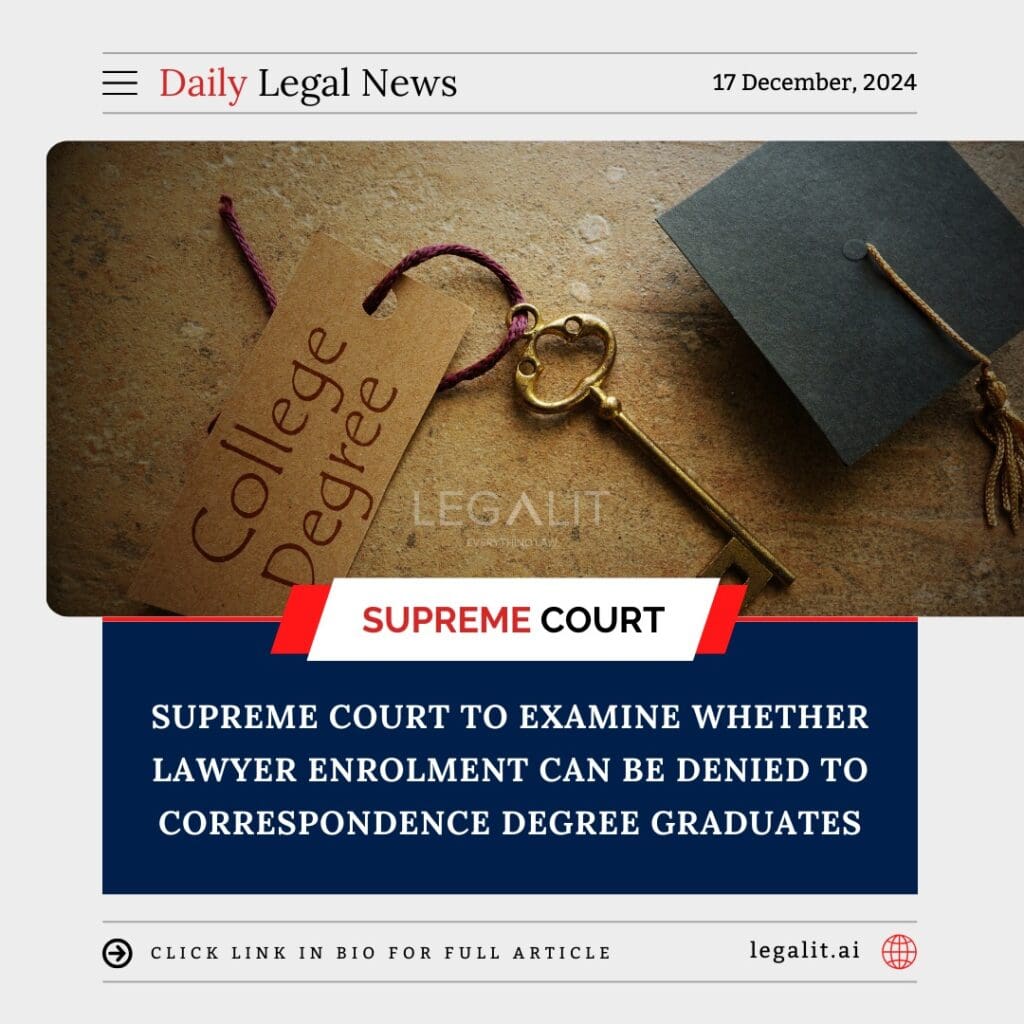
The Supreme Court of India has agreed to examine the issue of whether graduates with a correspondence law degree should be allowed to enrol as lawyers. The case revolves around the question of whether a law degree obtained through distance education can be considered equivalent to a regular law degree, thus allowing graduates to practice law.
Background:
The issue surfaced when a number of graduates with law degrees earned through correspondence courses sought enrolment with the Bar Council of India (BCI) to practice law. However, the BCI rejected the enrolment of these candidates, arguing that a correspondence law degree did not meet the standards required for professional legal practice.
The petitioners contended that they had completed their law studies through recognized universities that offered correspondence or distance learning programs. They argued that these degrees were valid and should be treated the same as those obtained through regular, in-person law courses. The petitioners challenged the Bar Council’s stance, seeking a review of the denial.
The case is significant as it raises important questions regarding the eligibility criteria for legal professionals and whether distance learning, which is becoming increasingly popular, should be accepted for enrolment as a lawyer. The Supreme Court has decided to delve into these questions, with a view to clarifying the legal position on the matter.
Court’s Rationale:
During the initial hearing, the Supreme Court acknowledged the growing popularity of distance education and the increasing number of law schools offering correspondence programs. The Court noted that while the objective of legal education is to equip individuals with the necessary skills and knowledge to practice law, it also aims to uphold the standards of the legal profession.
The Bench expressed concerns about the quality of legal education provided through correspondence programs, suggesting that such courses might not provide the same level of interaction, hands-on training, and exposure to practical aspects of law as regular, in-person programs. The Court raised the possibility that correspondence degrees might not fully prepare students for the rigors of legal practice, which requires a deep understanding of the law, critical thinking, and practical application in courts.
At the same time, the Court acknowledged that many distance education programs are recognized by the University Grants Commission (UGC) and other regulatory bodies. The Bench emphasized the need to balance the right to access legal education with the need to maintain high standards in the legal profession.
Existing Measures:
Currently, the Bar Council of India’s regulations prohibit enrolment of candidates with degrees obtained through correspondence programs for legal practice, unless the institution offering the course is specifically recognized by the Bar Council. In contrast, regular law degrees from recognized institutions are widely accepted for enrolment.
The Court’s decision to examine the matter is expected to have a significant impact on the future of legal education in India, particularly with respect to correspondence and distance learning programs. It may lead to the development of more uniform standards for law schools that offer non-traditional learning paths.
Conclusion:
The Supreme Court’s examination of whether lawyer enrolment can be denied to graduates with correspondence law degrees will be pivotal in determining the future of legal education in India. This case could lead to changes in the regulatory framework for law degrees, potentially allowing for greater access to the profession while ensuring that standards of legal education and practice are upheld. The decision will have significant implications for both aspiring lawyers and the broader legal community in India.